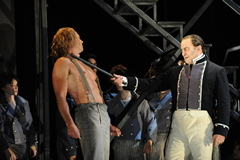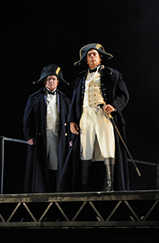| Opera Reviews | 16 May 2024 |
| Opera
Australia at its very best by Sarah Noble |
|
| Britten: Billy Budd Opera Australia Sydney Opera House 24 September 2008 |
|
|
The story opens upon the ageing Captain Edward Fairfax "Starry" Vere, recalling the year 1797, when he commanded the Indomitable. Haunted by remorse, he remembers the young Billy Budd, a talented and beautiful sailor with a heart of gold, pressed into the ship's service. The opera continues as Vere's flashback. Billy is innocent, kind and fiercely loyal; but that very goodness - and his remarkable beauty - earn him the obsessive hatred of the despotic master-at-arms, John Claggart, who plots to destroy him with a false charge of treason. The plot succeeds, but, bewildered by his interrogation, Billy strikes Claggart and kills him. Vere has no choice but to call a court martial, knowing that Billy will be sentenced to death but unable to budge from his own strict code of ethics. He is stricken with guilt. But Billy comes to accept his fate and with his last words, blesses his beloved Captain. The opera ends with the elderly Vere once more, still tormented by his memories, but clinging to that final blessing for his own redemption. Richard Hickox, Opera Australia's music director and an internationally acclaimed Britten specialist, leads a sweeping, richly-textured performance of this haunting score. He conveys the grandeur of its climaxes without lapsing into melodrama, and draws out its contrasting orchestral textures with warmth and clarity. Especially striking are the undulating strings, conjuring up both the physical ocean and all the psychological turmoil for which it stands. Kiwi baritone Teddy Tahu Rhodes is an ideal Billy, possessing all the
vocal prowess and all the physical beauty the role requires. Despite his
imposing physical presence, he captures beautifully the side of Billy
which is still essentially an innocent child. He throws himself fearlessly
into both the physicality and the emotional requirements of the role,
and his smooth, sonorous singing is hugely expressive. Billy's final monologue,
sung as he waits, in chains, to be executed, is devastating. |
|
|
John Wegner is outstanding as the terrifying Claggart, his tone alternately growling and caressing and his whole being an embodiment of diabolical malice. In a sea of ruddy sailors' faces, Claggart's face is an ghostly shade of white - he radiates unnatural evil before he has even sung a note. His credo (reminiscent of Iago's in Verdi's Otello) in which he outlines his hatred of Billy and its attendant schemes for his downfall, is a bloodcurdling tour de force. The sterling supporting cast is a showcase of some of the country's finest male singers, including particularly strong performances by Barry Ryan and Andrew Collis as Mr Redburn and Mr Flint, and Luke Gabbedy as the larrikin Donald. Andrew Goodwin is touching as the young Novice, while Kanen Breen's thin, reedy tenor is just right for the snivelling Squeak. The remainder of the cast is too numerous to list in its entirety, but all members are worthy of praise. The men's chorus is in superlative form, singing with unity and shimmering voice. Neil Armfield's excellent direction draws out not just the horror and suffering of this story, but also its humour and beauty. He explores all the ambiguous depths and destructive power of good and evil without forcing any single resolution upon their eternal struggle. Brian Thomson's set is stark, industrial and abstract - a single platform, surrounded by a few pieces of scaffolding, rises, falls and rotates to represent every part of the ship. Set against a vast blackness, it evokes not so much the detail of life at sea as the psychology of it, of a profound sense of isolation. Nigel Levings' lighting enhances the eerie mood and his representation of Billy's execution is a particular stroke of genius. Armfield's Billy Budd has been called one of Opera Australia's finest: it's a reputation richly deserved. Brought to life by such a convincing, talented creative team, it is nothing short of phenomenal. |
|
| Text ©
Sarah Noble Photos © Branco Gaica |

 Not
every great composer has been lucky enough to find a librettist of equal
inspiration. Benjamin Britten, however, was blessed with several superb
librettists, whose creations not only match the excellence of his music,
but stand on their own as works of real literary merit. The libretto for
Billy Budd is a prime example. Adapted from Herman Melville's unfinished
novella by novelist E.M. Forster and longtime Britten collaborator Eric
Crozier, it is at once readily intelligible and powerfully poetic. Britten's
extraordinary score could ask for no better partner.
Not
every great composer has been lucky enough to find a librettist of equal
inspiration. Benjamin Britten, however, was blessed with several superb
librettists, whose creations not only match the excellence of his music,
but stand on their own as works of real literary merit. The libretto for
Billy Budd is a prime example. Adapted from Herman Melville's unfinished
novella by novelist E.M. Forster and longtime Britten collaborator Eric
Crozier, it is at once readily intelligible and powerfully poetic. Britten's
extraordinary score could ask for no better partner.  The
opera may be titled Billy Budd, but ultimately it is Captain Vere,
and not Billy, who is its centre. Vere's moral crisis is the crux of the
story, and it is his tormented recollections which frame the opera, as
prologue and epilogue. English tenor Philip Langridge is arguably the
finest Britten tenor of his generation and he is stunning in this vital
role. Age has brought to his voice an ideal patina of craggy maturity,
mingled still with a freshness of tone which makes Langridge equally convincing
as both and old man and as his younger self. He doesn't so much play the
role as inhabit it completely, giving a performance of rare poignancy
- truly a privilege to behold.
The
opera may be titled Billy Budd, but ultimately it is Captain Vere,
and not Billy, who is its centre. Vere's moral crisis is the crux of the
story, and it is his tormented recollections which frame the opera, as
prologue and epilogue. English tenor Philip Langridge is arguably the
finest Britten tenor of his generation and he is stunning in this vital
role. Age has brought to his voice an ideal patina of craggy maturity,
mingled still with a freshness of tone which makes Langridge equally convincing
as both and old man and as his younger self. He doesn't so much play the
role as inhabit it completely, giving a performance of rare poignancy
- truly a privilege to behold. 




